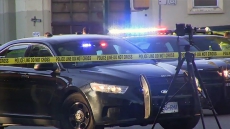VANCOUVER — British Columbia's anti-gang squad is putting a more public face on the gang lifestyle — and it's not pretty.
The Combined Forces Special Enforcement Unit has released its annual report aimed at discouraging involvement in gangs, especially for young women who follow the lustre but find something entirely different.
The report, released this week, features a soul-baring story by an anonymous woman who said she lost a decade of her life to gangs.
The tale of a Metro Vancouver woman's "long-term relationship with organized crime" talks of her addictions, her job ferrying drugs and money across the country and the murders of her friends.
She said she found power, respect and friendship with two gang members who were later discovered murdered on a road in rural Surrey, B.C.
"His parents chose to have an open casket," she said of attending the funeral for a young man she called Terry.
"They were making a point for the handful of us who were there. We had all partied together at some point or other. The bullet hole in his head was still prominent."

The squad's media spokesman Staff Sgt. Lindsey Houghton said the woman approached them to tell her story.
"We were just blown away by that lifestyle that we don't often get a glimpse of," he said in an interview Wednesday.
Houghton said it was therapeutic for the woman, whose parents still don't know that she was involved with crime and gangs.
The unit is hoping her story and others in the report might take some of the shine off the gangster lifestyle for those thinking about getting involved.
"There are days where it does feel like we're swimming up a waterfall," he said of fighting the perception of glamour that criminal gangs attempt to put out.
But there are other days when they go into schools and talk to kids about the realities of gangs and really feel like they're making progress, he added.

The unit is made up of nearly 400 officers and civilians who work to fight organized crime, curb gang activity and educate the public in B.C.
Its annual report also shows homicides and attempted homicides have climbed to 30 so far this year, compared with 18 for all of last year.
Houghton said the spike is mostly due to the gang conflict this spring in Surrey and Delta where police counted more than 30 shootings over what they believe was a low-level drug war.
He said the shooting stopped in July after the arrest of some suspects, while others involved fled to India and the remainder found the police and media spotlight too glaring.
He called the shootings juvenile and petty.
"They don't often think of the ramifications of their actions, driving around with a handgun doing drive-by shootings. ... These young people really don't think much of it anymore and we need to change that."

Houghton noted the number of deaths and injuries has dropped dramatically since 2008 and 2009 when police admitted Metro Vancouver was in the midst of a gang war.
Statistics in the report say there's a gang-related murder or attempted murder every 10 days on average in the province. Since January 2006, there have been 172 victims of gang homicide.






